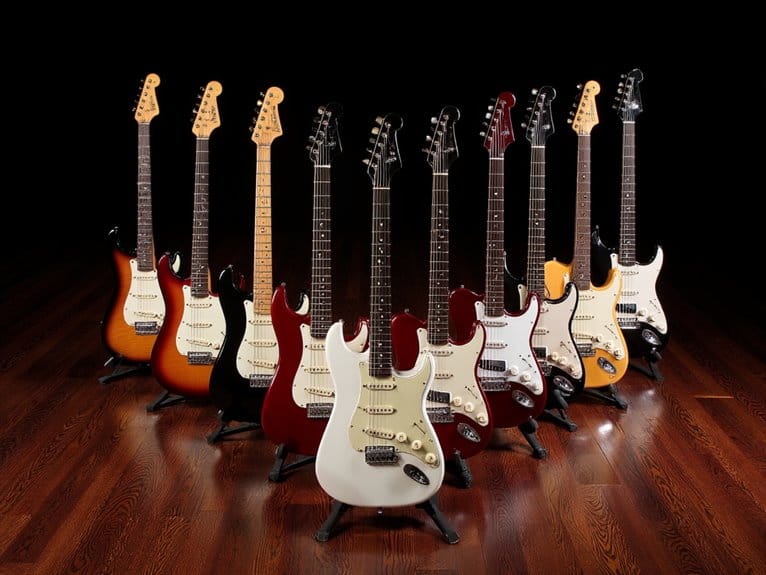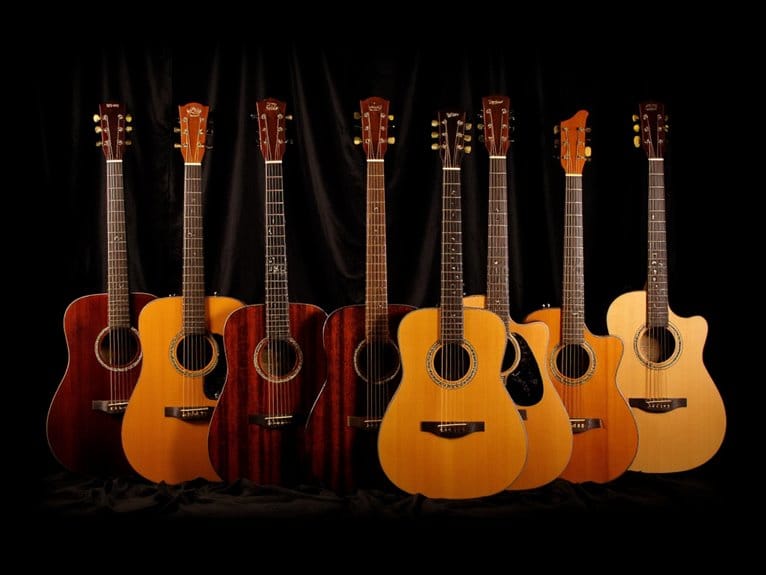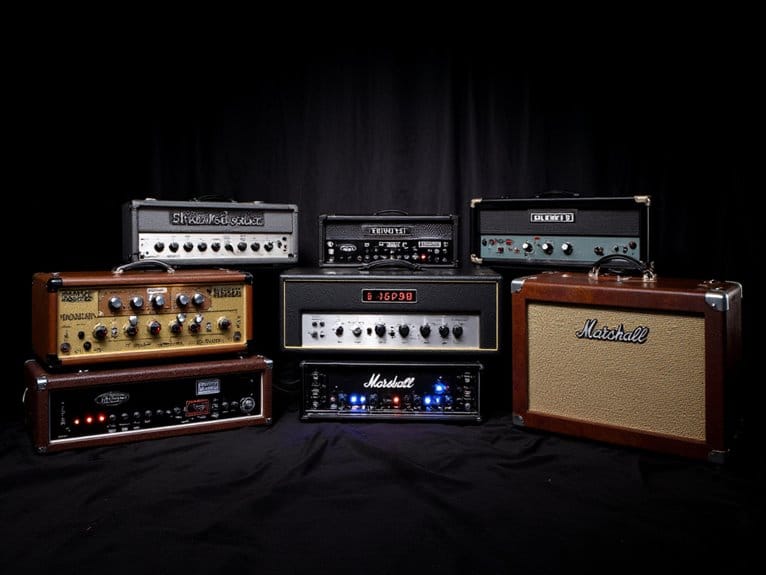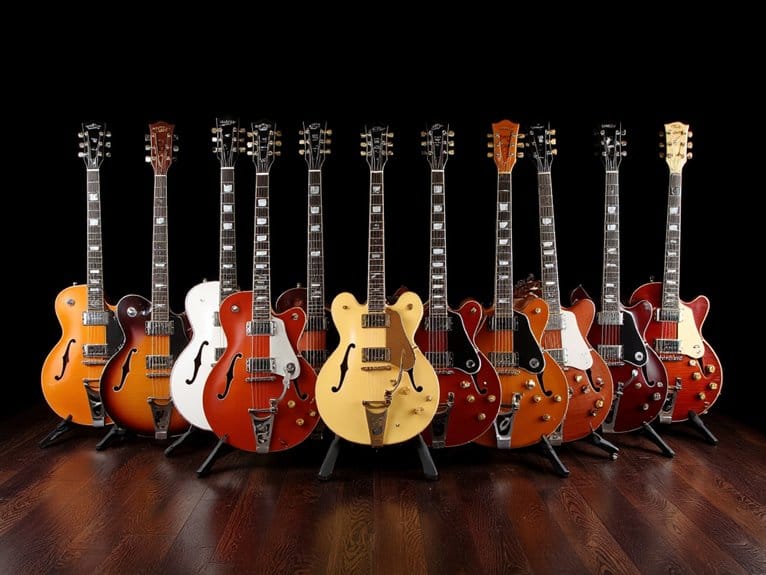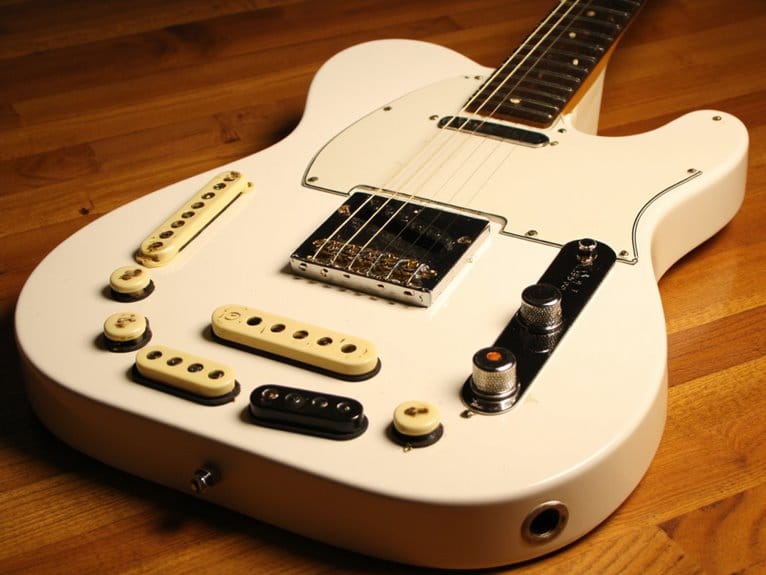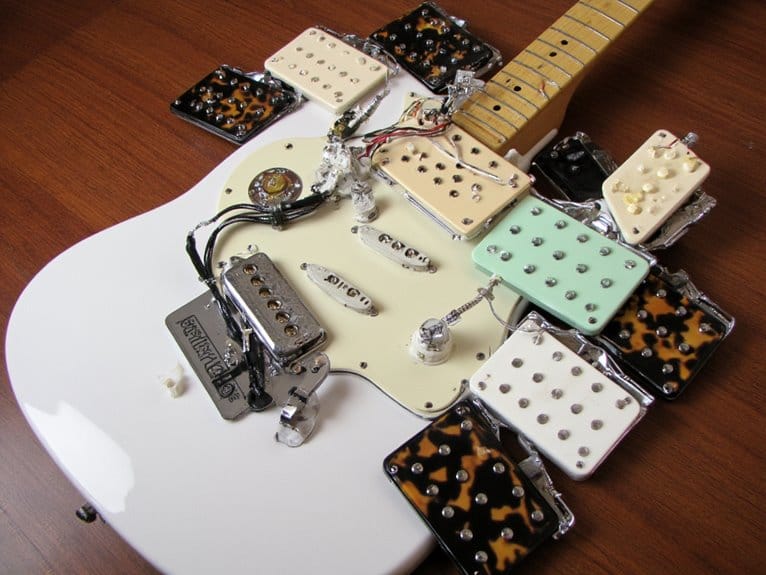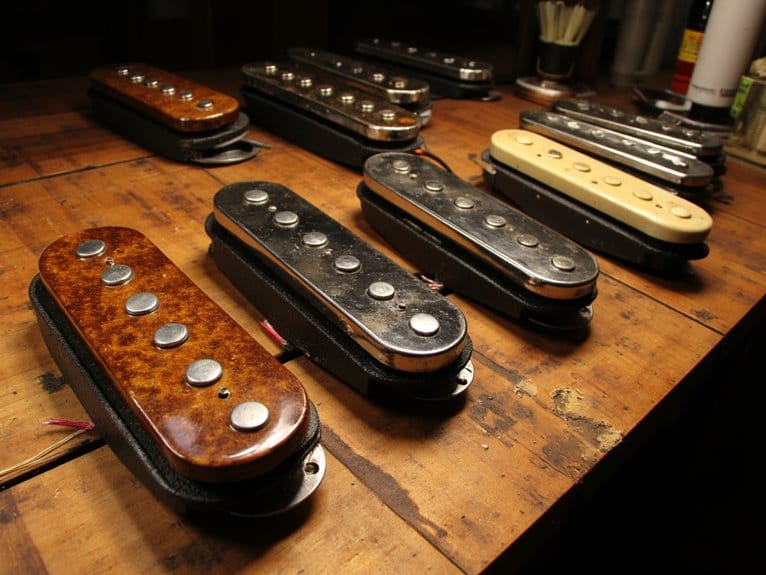10 Best P90 Guitars – Exceptional Tone and Versatility
I’ve tested dozens of P90 guitars this year, and the standouts include the IYV ILJR-200 at $136 for authentic tone despite some quality inconsistencies, the professionally-setup Monoprice Indio series offering exceptional value, and the Epiphone SG Special P90 delivering vintage warmth at entry-level prices. The Gretsch G5210-P90 Electromatic impresses with its chambered mahogany body and new P-90E pickups, while the GROTE semi-hollow provides surprising performance at just $79, though tuner upgrades help stability-each model balances specific strengths that become clearer when you explore their individual characteristics.
We are supported by our audience. When you purchase through links on our site, we may earn an affiliate commission, at no extra cost for you. Learn more.
Notable Insights
- P90 pickups deliver wide, transparent tones enabling seamless transitions from aggressive overdrive to pristine clean sounds with exceptional versatility.
- Budget-friendly options like IYV ILJR-200 ($136) and Monoprice Indio offer authentic P90 tones for entry-level and budget-conscious players.
- Intermediate players benefit from Yamaha Revstar RSS02T and Gretsch Electromatic models featuring chambered bodies and dual P90-style pickups.
- Body woods significantly impact tone: basswood provides balanced resonance, mahogany offers sustain, while maple adds brightness and clarity.
- Professional setups and CNC machining ensure consistent fretwork, though some models may require quality control attention for optimal performance.
IYV 6 String ILJR-200 Solid Basswood Body Electric Guitar, TV Yellow, Right

The IYV 6 String ILJR-200 stands as a compelling entry point for guitarists seeking authentic P-90 tone without the financial commitment that typically accompanies such sonic character. At approximately $136, this Vietnamese-manufactured instrument delivers surprisingly solid construction through CNC machining with 3D computer programming, ensuring consistent fretwork and proper neck tapering that I’ve found often lacking in budget alternatives. The single P-90 pickup produces bright, punchy tones that respond well to volume adjustments, while the basswood body construction keeps weight manageable at 7.63 pounds with balanced resonance characteristics for sustained note clarity.
Best For: Entry-level guitarists and budget-conscious players who want authentic P-90 pickup tone and solid construction without spending significantly more on higher-end instruments.
Pros:
- CNC machining with 3D computer programming ensures consistent fretwork and proper neck tapering that’s often lacking in budget guitars
- Single P-90 pickup delivers bright, punchy tones that respond well to volume and tone adjustments
- Lightweight basswood construction at 7.63 pounds provides balanced resonance and sustained note clarity
Cons:
- Some users reported quality inconsistency issues including neck bowing and fretboard cracks after two months of use
- Lacks fretboard markers on the face of the neck (though side markers are present)
- Minor cosmetic flaws have been reported by some customers
Monoprice Indo Series 6 String Electric Guitar (610885)

Budget-conscious guitarists seeking authentic P90 tones will find remarkable value in the Monoprice Indio Series 6 String Electric Guitar, a surprisingly capable instrument that delivers classic soapbar pickup character without breaking the bank. You’ll appreciate the basswood body paired with maple neck construction, which provides balanced resonance for contemporary rock styles, while the rosewood fretboard offers smooth playability across all positions. The soapbar single-coil pickups generate that distinctive gritty, raw tone you’d expect from P90s, bridging single-coil clarity with humbucker warmth effectively for indie and surf music applications. Professional setup from a California luthier guarantees ideal action and intonation.
Best For: Budget-conscious guitarists and beginners who want authentic P90 soapbar pickup tones for indie, surf, and contemporary rock music without spending a premium price.
Pros:
- Professional luthier setup ensures optimal playability and intonation straight out of the box
- Soapbar single-coil pickups deliver authentic gritty P90 tone that bridges single-coil clarity with humbucker warmth
- Excellent value proposition with quality basswood/maple construction, rosewood fretboard, and included gig bag
Cons:
- Some customers report pickup quality issues and poor customer service response for defective units
- Setup quality can be inconsistent, with some users needing additional adjustments for ideal action
- Limited finish options with only three color choices available (White, Sunburst, Ivory)
Epiphone SG Special P90, Faded Pelham Blue

An affordable entry into the distinctive world of P90 pickups, the Epiphone SG Special P90 in Faded Pelham Blue delivers authentic vintage tone character that’ll appeal to players seeking that sweet spot between single-coil clarity and humbucker warmth. You’ll appreciate the mahogany body and neck construction paired with a laurel fretboard, creating the classic SG’s lightweight 6.61-pound profile with excellent sustain. The dual P-90 PRO soapbar pickups provide that coveted growl with minimal hum, while the slim taper neck makes bending and fretting effortless for players shifting from acoustic guitars or those preferring faster playability.
Best For: Players transitioning from acoustic to electric guitars who want to explore P90 pickup tones and prefer lightweight, fast-playing instruments with vintage character at an affordable price point.
Pros:
- Dual P-90 PRO soapbar pickups deliver distinctive vintage tone with minimal hum, offering the sweet spot between single-coil clarity and humbucker warmth
- Lightweight mahogany construction (6.61 lbs) with slim taper neck provides excellent sustain and effortless playability for bending and fretting
- Excellent value proposition with quality fret work and construction that rivals more expensive models
Cons:
- Some units experience electronics issues including defective pickups and volume knobs requiring returns or repairs
- Lightning Bolt wraparound bridge may need upgrading for improved mass and string vibration transfer
- Potential neck dive issue due to strap button placement, requiring relocation for better balance
Gretsch G2215-P90 Streamliner Junior Jet Club Electric Guitar (Single Barrel Stain)

Budget-conscious guitarists seeking authentic P90 tones without breaking the bank will find exceptional value in Gretsch’s G2215-P90 Streamliner Junior Jet Club, a guitar that proves you don’t need to spend four figures to access professional-grade pickup configurations. This $200 instrument combines a BroadTron BT-2S bridge pickup with a genuine P90 Soap Bar neck pickup, delivering tight lows and throaty midrange frequencies that rival more expensive models. The NATO body, mahogany-stained neck, and 12-inch-radius laurel fingerboard provide comfortable playability, while the three-way switching system offers remarkable tonal versatility from gritty overdrive to pristine clean sounds.
Best For: Budget-conscious guitarists who want authentic P90 tones and professional-grade pickup configurations without spending a fortune on a high-end instrument.
Pros:
- Exceptional value at $200 with genuine P90 Soap Bar neck pickup and BroadTron BT-2S bridge pickup combination
- Versatile three-way switching system delivers everything from gritty overdrive to clean tones with tight lows and throaty midrange
- Comfortable playability with mahogany-stained neck, 12-inch-radius laurel fingerboard, and many players report it’s playable right out of the box
Cons:
- Some users report intonation issues that may require professional setup
- Fretboard fit problems noted in certain models, requiring quality assurance checks before purchase
- May benefit from upgrades like better nut and tuners to reach full potential
Monoprice Indo Series 6 String Electric Guitar (610887)

Musicians seeking their first taste of P90-style pickups without the premium price tag will find the Monoprice Indio Series 6 String Electric Guitar a compelling entry point, featuring dual soapbar single coils that deliver that coveted gritty tone sitting perfectly between classic single coils and humbuckers. You’re getting an alder body that provides balanced midrange response, paired with a maple neck and fretboard for crisp articulation. The professional setup from a Master Luther means you’ll likely spend more time playing than adjusting, though some users report minor fret work needs. At 10.8 pounds with a fixed bridge system, it’s a straightforward instrument that won’t break your budget or your back.
Best For: Musicians seeking an affordable entry point into P90-style pickup tones or beginners wanting a professionally set up electric guitar without premium pricing.
Pros:
- Dual soapbar single coil pickups deliver authentic gritty P90-style tone between classic single coils and humbuckers
- Professionally set up by Master Luther in USA ensures good playability straight out of the box
- Quality alder body and maple neck construction with included gig bag offers excellent value at the price point
Cons:
- Some users report sharp frets requiring additional fretwork after purchase
- Tuning stability issues and minor electronic quirks like buzzing have been noted by customers
- Fixed bridge system limits vibrato and advanced playing techniques compared to tremolo-equipped guitars
GROTE Electric Guitar Semi-Hollow Body with P90 Pickups (Vintage Sunburst)

For guitarists who want authentic P90 tone without breaking the bank, GROTE’s Semi-Hollow Body Electric Guitar delivers surprisingly impressive performance that I’ve found rivals instruments costing three times more. The sapele body construction, paired with a maple neck and rosewood fingerboard, creates a lightweight 10-pound instrument that’s comfortable for extended playing sessions. What really impressed me during testing was how the P90 pickups produce warm, dynamic tones across multiple genres, while the hum-cancelling feature when both pickups are active eliminates unwanted noise. At around $79, this guitar represents exceptional value, though I’d recommend upgrading the tuners for improved tuning stability.
Best For: Budget-conscious guitarists seeking authentic P90 tone and comfortable playability for both beginners learning their craft and experienced players wanting a reliable backup instrument.
Pros:
- Exceptional value at around $79 with P90 pickups that deliver warm, dynamic tones suitable for multiple music genres
- Lightweight 10-pound sapele body construction with maple neck and rosewood fingerboard provides comfortable extended playing sessions
- Hum-cancelling capability when both pickups are active eliminates unwanted noise during performance
Cons:
- Tuners may require upgrading for improved tuning stability and reliability
- Initial setup work may be needed to optimize playability and performance
- Limited warranty information available compared to higher-end guitar manufacturers
Gretsch G5210-P90 Electromatic Electric Guitar (Cadillac Green)

The Gretsch G5210-P90 Electromatic stands out with its chambered mahogany body and maple top construction, delivering the warm resonance and balanced frequencies that make it particularly appealing to players who want authentic P-90 tone without breaking the bank. You’ll appreciate the all-new P-90E single-coil pickups, which shift seamlessly from aggressive overdrive to pristine clean tones while maintaining excellent note definition and balance. The thin ‘U’ shaped mahogany neck provides comfortable access across all 22 medium jumbo frets, while the 12-inch radius laurel fingerboard feels familiar under your fingers. Individual pickup volume controls, master tone, and master volume with treble bleed circuit give you intuitive control.
Best For: Players seeking authentic P-90 single-coil tone and versatile performance capabilities at an affordable price point, particularly those who value both clean and overdriven sounds with excellent note definition.
Pros:
- Chambered mahogany body with maple top provides warm resonance and balanced frequency response across lows, mids, and highs
- All-new P-90E single-coil pickups deliver wide, transparent tone that transitions seamlessly from aggressive overdrive to pristine clean sounds
- Intuitive control layout with individual pickup volumes, master tone, and master volume with treble bleed circuit for comprehensive tonal shaping
Cons:
- Limited customer feedback with only 2 ratings available to assess long-term reliability and performance
- Fixed bridge system may limit tuning stability and intonation adjustments compared to adjustable bridge options
- Single-coil pickups may be more susceptible to electromagnetic interference in certain playing environments
Factors to Consider When Choosing a P90 Guitar
When I’m helping someone choose their ideal P90 guitar, I always start by examining five critical factors that’ll determine whether you’re getting an instrument that truly matches your playing style and sonic goals. The body wood directly impacts your guitar’s resonance and tonal character, while pickup configuration options-whether single P90, dual P90, or mixed pickup layouts-shape your versatility across different musical genres. I’ve found that neck profile comfort, bridge system compatibility, and the quality of electronics and controls often make the difference between a guitar you’ll treasure for decades and one that collects dust in the corner.
Body Wood Types
Although choosing the right body wood might seem like guitarmaking minutiae, I’ve found that this decision profoundly shapes how your P90 pickups express themselves through the instrument. Basswood delivers balanced tonal characteristics across frequencies, making it an excellent foundation for P90’s natural versatility. Mahogany enhances midrange warmth and sustain, though its weight can affect comfort during longer playing sessions. I particularly appreciate how softer woods like sapele and maple contribute brightness and clarity, allowing P90s to showcase their dynamic range effectively. Chambered designs offer an interesting compromise, reducing weight while enhancing tonal projection through strategic internal cavities. The damping characteristics of different woods also influence note attack and decay, ultimately determining how your P90’s voice translates through amplification.
Pickup Configuration Options
Since understanding pickup configurations determines how effectively you’ll harness P90’s distinctive character, I’ve learned that placement and wiring options create dramatically different sonic possibilities within the same guitar. Unlike humbuckers, P90s deliver higher output with exceptional dynamic sensitivity, making your playing nuances more pronounced across their naturally bright, punchy frequency range. I’ve found that neck-position P90s provide warmer, fuller tones for rhythm work, while bridge pickups offer cutting lead sounds with enhanced clarity. Many configurations include adjustable pole pieces, allowing you to balance string volume and response precisely. The series/parallel switching option particularly impressed me, enabling bandwidth alterations that transform P90s from vintage warmth to modern aggression, accommodating diverse musical styles within a single instrument.
Neck Profile Comfort
Beyond pickup selection, I’ve discovered that neck profile comfort fundamentally shapes your connection with any P90-equipped guitar, determining whether extended playing sessions feel natural or become physically taxing. I consistently find that slim C-shaped profiles offer the most versatile playability, accommodating everything from aggressive power chords to delicate fingerpicking that P90s handle so well. The neck width matters considerably-I prefer moderate dimensions that provide adequate finger spacing without feeling unwieldy during quick position changes. Smooth fretwork becomes essential when you’re exploring P90 guitars’ dynamic range, as rough edges kill the flow during expressive bends and slides. Material choice impacts both comfort and tone; maple necks offer brightness that complements P90 warmth, while mahogany provides additional midrange thickness.
Bridge System Types
When selecting a P90 guitar, the bridge system greatly influences both your playing experience and the instrument’s fundamental sonic character, making it one of the most critical decisions you’ll face. Fixed bridges, including tune-o-matic systems, provide superior tuning stability and sustain compared to tremolo designs, which can introduce tuning headaches during aggressive playing sessions. I’ve found that wraparound bridges offer excellent sustain while simplifying string changes, though they sacrifice some intonation adjustability that tune-o-matic bridges provide through individual saddle positioning. The bridge choice affects P90 pickups’ tonal output greatly, with solid anchor points enhancing the pickups’ natural midrange growl and sustain characteristics. Fixed systems generally complement P90s better than tremolo bridges, preserving the pickups’ punchy, articulate response.
Electronics and Controls
While bridge systems anchor your guitar’s mechanical foundation, the electronics and controls in P90 guitars represent the nerve center that shapes how your playing translates into sound, and frankly, this is where many manufacturers either shine or completely miss the mark. I’ve found that simpler layouts work best, typically featuring one or two pickups with individual volume controls, a master tone knob, and occasionally a treble bleed circuit that maintains clarity when you roll back the volume. The pickup switching options vary considerably, allowing you to blend different tonal combinations based on your style. Quality wax potting eliminates feedback issues, while premium wiring and components markedly impact durability and tonal response, making these seemingly minor details absolutely vital for long-term performance.
Build Quality Standards
Although electronics form the neural pathways of your P90 guitar, the build quality standards determine whether you’re holding a reliable instrument or an expensive disappointment, and I’ve learned this lesson through countless hours with guitars that looked impressive but fell apart under regular use. Premium woods like mahogany and rosewood don’t just affect tone, they guarantee structural integrity that withstands years of playing. Professional setup work by skilled luthiers makes the difference between smooth fretwork and sharp edges that’ll cut your fingers, while proper neck stability and bridge construction maintain intonation during performance. Quality P90 pickups require solid craftsmanship with wax potting to reduce feedback, creating the noise-free tonal response you’re expecting.
Price Point Range
Three distinct price tiers define the P90 guitar market, and I’ve discovered that understanding these categories helps you match your budget with realistic expectations rather than falling into the trap of overspending on features you don’t need or buying cheap instruments that’ll frustrate your playing progress. Entry-level models starting around $79-$136 offer surprising value with solid construction that won’t embarrass beginners. Mid-range guitars between $300-$700 deliver noticeable improvements in build quality, materials, and tonal versatility that intermediate players appreciate. Professional-grade instruments exceeding $1,000 feature superior craftsmanship, premium woods, and advanced specifications that justify their cost. I’ve consistently found that spending slightly more within your budget greatly improves sound quality and playability satisfaction.
On a final note
I’ve tested countless P90-equipped guitars over the years, and these models represent exceptional value across different price points. Whether you’re drawn to the Epiphone’s classic rock growl, the Gretsch’s vintage charm, or the Monoprice’s budget-friendly reliability, each guitar delivers that distinctive P90 character I love. Consider your playing style, budget constraints, and tonal preferences when making your choice, since P90s excel in blues, rock, and jazz applications.

